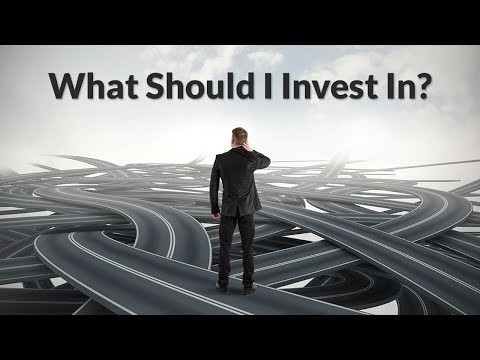What should I invest in
Post on: 16 Март, 2015 No Comment

When it comes to investing, there are a number of different types of investment vehicle for you to consider.
As each has its own characteristics, picking the one — or even two or three — that’s right for you could bring additional benefits to your investment strategy.
Shares
If you invest directly in shares you are holding a small part of a company and will benefit financially if it is successful, either through an increase in the share price or through dividends, where the company distributes the profits it doesn’t reinvest in the business.
Shares are bought through a stockbroker or an online sharedealing service and you’ll pay a charge of around £10 plus stamp duty of 0.5 per cent of your investment. However, shares listed on the Alternative Investment Market (Aim) are free of stamp duty from 6 April 2014.
- You can choose which companies you want to invest in.
- As a shareholder you usually have the opportunity to vote on some company decisions.
- Lack of diversity — unless you hold a portfolio of shares your investment is concentrated in one company.
- Dealing charges can make this an expensive way to invest if you are a small investor .
Investment funds
Funds such as unit trusts and open-ended investment companies (Oeics) are collective investments which allow investors to pool their money together to create a large fund that invests across a range of different shares and/or other assets such as bonds or property. This is run by a professional manager in line with the fund’s objectives.
Not all funds are actively managed: some are run on a passive basis with a computer programme replicating the holdings of an index such as the FTSE 100 or the FTSE All-Share. This means the performance of the fund will never beat the return of the index, although this isn’t necessarily something that an actively-managed fund will do either.
To invest, you buy units with minimum investments as low as £500 or £25 a month, and there are no restrictions on when you sell. Charges vary depending on the type of fund and how you buy it but are typically an initial charge of up to 5 per cent (refunded by most brokers) and an annual management charge (AMC) of up to 1.5 per cent. The AMC includes not only the fund manager’s fee but also payments to the intermediaries involved.
Following the introduction of new transparency requirements, fund managers are currently in the process of shifting to ‘clean’ share classes, where the only charge is the manager’s fee, as opposed to a bundle of several fees which can make it more difficult to know exactly how much you are paying.
The charge for active fund managers is typically be 0.75 per cent, but you will also pay a platform fee on top of that.
- Instant diversification without a large upfront investment by you
- Investment decisions are taken by an experienced professional manager
- Thousands of different funds to choose from investing in equities, bonds and property as well as other types of assets
- Management charges can be high.
- The manager doesn’t necessarily get it right.
Investment trusts
An investment trust is a form of collective investment where you buy shares in a company, which then uses the money raised to invest in a range of assets on your behalf. Just like investment funds there is a wide range available, with a variety of different objectives that determine how they invest and the assets they hold.
There are also some key differences between trusts and funds, which can make the former a more sophisticated, and therefore slightly riskier, investment than the latter.

Investment trusts are able to borrow money, known as gearing, which can help to increase profits but can also magnify any losses in a falling market.
Additionally they are closed-end. This means that a finite number of shares are available, so the share price will be affected by supply and demand as well as the value of the underlying assets. This means the shares can trade at a discount or a premium to the net asset value.
Although some are available directly from the investment trust manager, they are normally traded on the stock market, making them more akin to a share. This means you might need to factor in dealing charges and stamp duty of 0.5 per cent as well as an annual management charge.
- Instant diversification without a large investment.
- Gearing means gains can be magnified, although the same also applies to losses.
- Normally lower annual management charge than an equivalent fund.
- Returns can be enhanced if you buy on a discount and it narrows (because the trust is becoming more popular, for example).
- Dealing charges can make this expensive for a smaller investor.
- More sophisticated and potentially more risky investment than a fund, because of the potential for losses to be magnified by gearing and discount movements.
For more details about investment trusts read our beginner’s guide
Pension funds
A pension fund operates in exactly the same way as a fund, with a manager investing according to the fund’s objectives, but because it is a wrapper specifically for pension investments, there are some important tax advantages.
Subject to your earnings and the annual and lifetime pension limits, anything paid into a pension fund receives tax relief at the basic rate, effectively topping up an £80 contribution to £100. Higher-rate taxpayers receive tax relief at their highest marginal rate. Additionally, although you cannot reclaim the 10 per cent tax credit on dividends, all income and gains in the fund are also tax-free.
However when you come to take benefits, either as an annuity or when drawing income from a personal pension, these are subject to income tax.
- Instant diversification.
- Tax breaks.
- Money cannot be accessed until retirement.
Exchange Traded Funds
Another form of collective investment, exchange traded funds (ETFs), seek to replicate the performance of an index, commodity or basket or assets. This tracking is achieved either by holding the constituents of the index or by using derivatives to create it synthetically.
ETFs are a branch of ‘exchange traded products’, which also encompass exchange traded commodities and exchange traded notes.
Other ETFs also seek to follow thematic investment indices, such as those that comply with Shariah law or socially responsible principles, or which appeal to income-seekers, for example.
ETFs are traded on the stock market, so there are upfront dealing charges to consider, although they are exempt from stamp duty. The annual management charge is very low, with many ETFs having an annual total expense ratio of less than 0.5 per cent.
- Low cost.
- Access to more exotic markets as well as the well-known indices.
- Instant diversification .
- Counterparty risk on synthetic ETFs .
For information on investing in exchange traded funds read our guide to ETFs
Venture Capital Trusts
A venture capital trust (VCT) is a form of investment trust that invests in fledgling companies that are looking to develop their business. The nature of these companies means that this is a higher risk investment: while some will turn into the large corporations of tomorrow, others will inevitably fail.
As a result there are a number of tax incentives to encourage investment. These include tax-free income, dividends and gains and an income tax rebate of 30% of your initial investment into new VCT shares, providing you have paid sufficient income tax that year and you hold the shares for at least five years.
The maximum investment to obtain tax relief is £200,000 a year but, due to the high level of risk, it is recommended that VCTs only form a small part of your total investment portfolio.
However, so-called generalist VCTs in particular are becoming a more widely-used choice as an alternative to pension investments, owing to their effectiveness in generating tax-free dividends to supplement income, according to a survey of financial advisers conducted in late 2013.
They might also work as a tax-efficient investment for investors who have used up their Isa allowance for the year.
- Generous tax breaks.
- Opportunity to invest in very small companies .
- Income payouts make them increasingly attractive for retired investors.
- High risk and therefore more suited to sophisticated investors.
For more on Venture Capital Trusts see our VCT beginner’s guide














